新概念第二册22课
新概念英语第二册课件Lesson22(共22页)

• 名词 n.
channel['tʃænl]
• 1.水道,航道
• The channel is marked by buoys. • 航道由浮标标示。 • 2.海峡
• The English Channel separates France from England. • 英吉利海峡将法国与英国分开。 • 3.沟渠;河床 • 4.途径;渠道;手段[P1]
= more money • give me more 再给我一点 • a little 稍微,可以修饰比较级;much修饰比较级,译为
“多得多” • It's a little hotter.
• It's much hotter. • That is more expensive. (贵一些) • That is a little more expensive. (稍微有点贵) • That is much more expensive. (贵得多)
• 3、Both girls write to each other regularly now.
• write to sb. 给某人写信 • write (a letter) to me • each other 相互,彼此,往往强调两者之间的相
互 (注意连读)有时这个短语也可用来指许多人之 间“互相” • We must all help each other. • one another 强调三或三者以上的相互,有时可 替代each other • They do this by sending messages to one another.
新概念二-第22课课件
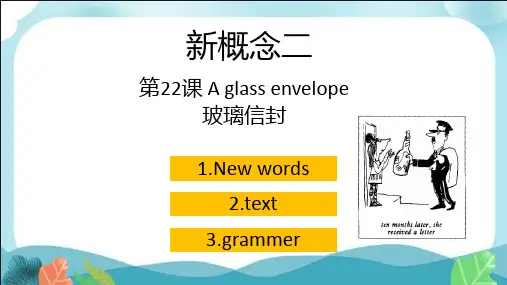
e.g. I dreamed of flying in the sky
·★1 ★dream v. 做梦,梦想
③n.梦;梦想,幻想
have a (good/bad) dream = dream a dream 做了个梦 dream boat 梦中情人,梦寐以求的(物,人) daydream v./n.思想开小差,做白日梦
课文注释
6. Letters will cost a little more, but they will certainly travel faster. 这样会稍微多花点钱,但肯定是快得多了。 (1)more和faster都是副词的比较级。这里隐含的比较成分是邮局寄信与海上漂瓶。 (2)动词cost意为“(使)花费”、“价钱为……”,其主语通常为某物或某件事情; It costs a lot to buy a house. 买一所房子要花许多钱。
课文注释
1. A glass envelope, (标题)玻璃信封。 因为第一封信是装在瓶子里的,瓶子便成了那张写有地址的纸条的玻璃信封。
2. My daughter, Jane, never dreamed of receiving a letter from a girl of her own age in Holland. 我的女儿简从未想过会收到荷兰一位同龄姑娘的来信。 文中 dreamed of后面的部分都是宾语。动名词 receiving带有自己的宾语a letter。 (cf.第 20课语法)receive…from…表示“从……收到……”。
课文注释
4. She never thought of it again… 此后她就再没去想那只瓶子…… think of指“考虑”、“想”、“想起”等: Do you ever think of the girls you met at a party? 你会想起你在一个晚会上遇到的姑娘们吗? 5. Both girls write to each other regularly now. 现在这两位姑娘定期通信了。 both的用法在第14课词汇学习中已经讲过。它用在名词前面时,of可有可无。在both girls中,both为形容词;在both of the…结构中,both为代词。each other指互相,一般作宾语。
新概念二22课
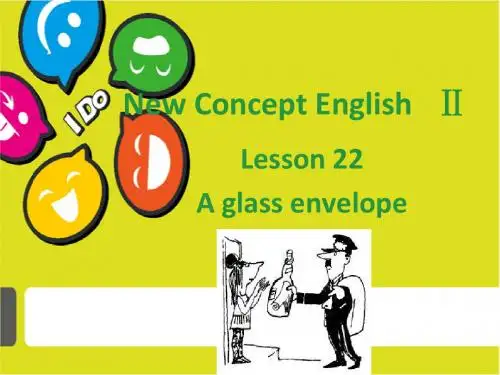
• 3、后接in的动词:
• believe in(信仰);delight in(喜欢) ;employ(ed) in (从事);encourage in (鼓励);engage(d) in(正做); experience(d) in(在……有经验);fail in (没有尽到);help in/with(帮助); include in(包括);indulge in(沉醉) ;instruct in(教导);interest(ed) in( 对……感兴趣);invest in(投资); involved in(卷入);persist in(坚持) ;share in(分享)
Listen to the recording, and answer the question How did Jane receive a letter from a strange?
Pre-tasks (after watching the video)
• What did Jane do when she and her family were travelling across the channel?
New Concept English Ⅱ
Lesson 22 A glass envelope
Do you have a pen friend? Where is he?
在美国教中文的杨老师回国后收到的学生来信…… 你好!杨老师: 我是刘学生,我贵姓刘,您给了我的名字。 您活(live in)在中国的时间太久了,我们都很失去您(miss you)。放假,没有学校了。我的中文不但快快的坏了,我 的体重而且慢慢地大了。 您的身体怎么样?天气在北京怎么办(how is the weather in BJ)?今天是星期末,您必须在用朋友玩儿,我猜? 或者,在做研究功课,勤勤奋奋?再次,我们真的失去您 了(miss)。我们老老实实(to be honest)地希望您来美国回 的早。 请让我们认识您的飞翔号码( flight number),所以我们可 以去飞机场一起把您拣回来(pick you up)。 您的学生 刘迈克
新概念英语第二册第22课.doc
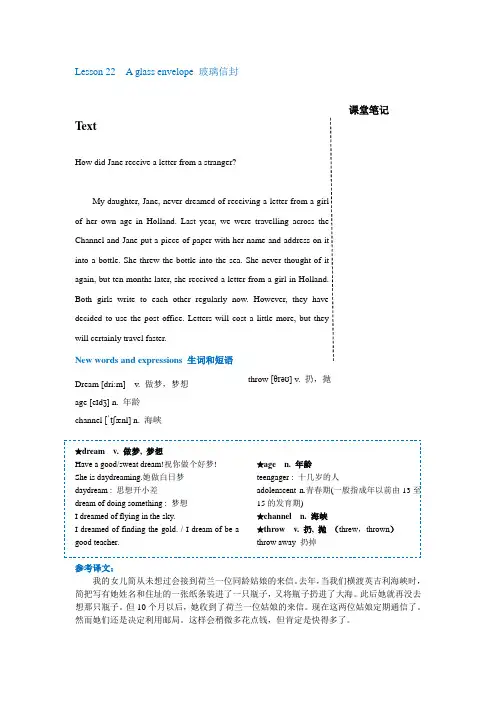
Lesson 22 A glass envelope 玻璃信封TextHow did Jane receive a letter from a stranger?My daughter, Jane, never dreamed of receiving a letter from a girlof her own age in Holland. Last year, we were travelling across the Channel and Jane put a piece of paper with her name and address on it into a bottle. She threw the bottle into the sea. She never thought of it again, but ten months later, she received a letter from a girl in Holland. Both girls write to each other regularly now. However, they have decided to use the post office. Letters will cost a little more, but they will certainly travel faster.New words and expressions 生词和短语Dream [dri:m] v. 做梦,梦想age [eɪdʒ] n. 年龄channel [ˈtʃænl] n. 海峡throw [θrəʊ] v. 扔,抛★dream v. 做梦, 梦想Have a good/sweat dream!祝你做个好梦!She is daydreaming.她做白日梦daydream : 思想开小差dream of doing something : 梦想I dreamed of flying in the sky.I dreamed of finding the gold. / I dream of be a good teacher. ★age n. 年龄teengager : 十几岁的人adolenscent n.青春期(一般指成年以前由13至15的发育期)★channel n. 海峡★throw v. 扔, 抛(threw,thrown)throw away 扔掉参考译文:我的女儿简从未想过会接到荷兰一位同龄姑娘的来信。
新概念英语第二册lesson22
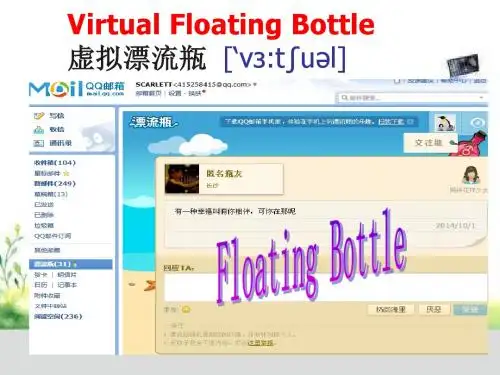
With no stamp on it
Floating Bottle 漂流瓶 Float [flot] vi. 浮动;飘动,
Unit 22 A glass envelope['envələʊp]
What do you think is happening in the picture ? A post man is handing over a bottle town
think-thought-thought
At the age of 8,…… of (of My daughter, Jane, never dreamed _____ of / about )receiving a letter from a girl _____
Lei Feng was always thinking ______others.
Key Structure: Verbs followed by of, from, in and on
Jane never dreamed of receiving a letter…(11. 1-2) She never thought of it again. (11. 4-5) She received a letter from a girl in Holland. (11. 5-6)
②. What happened ten months later ? She received a letter from a girl of her age. ③. How do the two girls send letters to each other now?
新概念英语第二册第22课
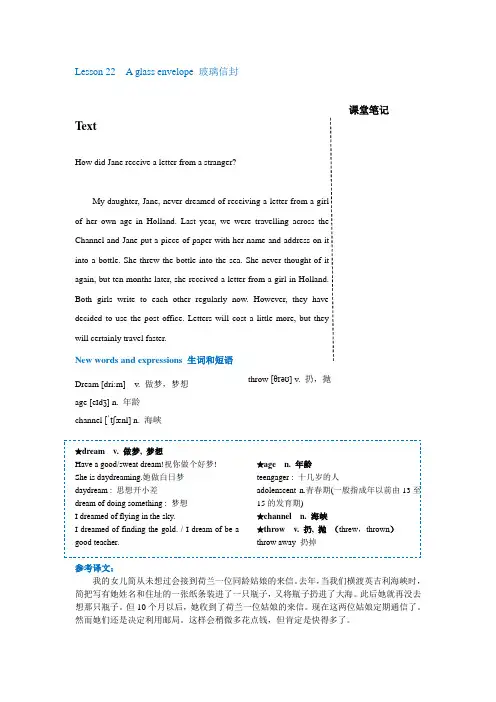
Lesson 22 A glass envelope 玻璃信封TextHow did Jane receive a letter from a stranger?My daughter, Jane, never dreamed of receiving a letter from a girl ofher own age in Holland. Last year, we were travelling across the Channel and Jane put a piece of paper with her name and address on it into a bottle. She threw the bottle into the sea. She never thought of it again, but ten months later, she received a letter from a girl in Holland. Both girls write to each other regularly now. However, they have decided to use the post office. Letters will cost a little more, but they will certainly travel faster.New words and expressions 生词和短语Dream [dri:m] v. 做梦,梦想age [eɪdʒ] n. 年龄channel [ˈtʃænl] n. 海峡throw [θrəʊ] v. 扔,抛★dream v. 做梦, 梦想Have a good/sweat dream!祝你做个好梦!She is daydreaming.她做白日梦daydream : 思想开小差dream of doing something : 梦想I dreamed of flying in the sky.I dreamed of finding the gold. / I dream of be a good teacher. ★age n. 年龄teengager : 十几岁的人adolenscent n.青春期(一般指成年以前由13至15的发育期)★channel n. 海峡★throw v. 扔, 抛(threw,thrown)throw away 扔掉参考译文:我的女儿简从未想过会接到荷兰一位同龄姑娘的来信。
新概念第二册第二十二课
• 德国男子年轻时抛出漂流瓶 53年后收到回信
• 据德国《图片报》1月5日报道,德国一名老人年轻时向河 中抛出了一只漂流瓶,时隔53年后,他意外地收到了回信。 • 报道称,这名老人名叫霍约尔(Heuer),现年73岁,居住 在北威州(NRW)。53年前,尚在军中服役的他经历了2次 失败的约会,绝望之余,他将自己的姓名地址和希望能与 女士通信的想法写在了一张纸条上,随后装入漂流瓶中抛 向河里,但这个漂流瓶直到最近才被人在巴伐利亚州 (Bayern)发现。
• 3、Both girls write to each other regularly now. • Irregular • regular customers • regular mail regular meeting keep regular hours
• Tell the differences:
• the others: 是 “其余的” 意思, 表 示在一个范围内的其他全部, 如: This dictionary is better than the others. 这本字典比别[其余] 的好。 • the other: 是其中的“另一个”, 如: • Give me the other one; not this one. 给我那一个, 不是这一个。
• 两个中的“另一个”是 “the other”; 不定数目中的 “另 一个”是 “another” , 如: This glass is broken. Get me another. • 这个杯子坏了, 给我另拿一个 来。(在许多杯子中的一个)
• Exercise • Will you show me___________? I don’t like it’s color. • She has two computers. One is IBM PC 386 and ___________is IBM PC 574. • Tom runs faster than any ___________students in his class. • The student has English, Chinese, math and many ____________subjects. • Why are only three of you here in the classroom. Where are ____________? • My classmates come from different parts of the country. Some come from Shanghai, some from Jinan and ____________ from Beijing.
新概念二册第22课笔记
新概念二册第22课笔记一、课文内容A private conversation二、核心词汇与短语1. private 私人的2. conversation 对话,交谈3. by the river 在河边4. give sb a push 推某人一下5. apologize to sb 向某人道歉6. make a noise 发出噪音7. over and over again 反复8. pay no attention 不注意9. a great many 许多10. in the distance 在远处三、重点语法1. 现在完成时态(Present Perfect Tense)- 基本结构:have/has + 过去分词- 用法:表示过去发生的动作对现在产生的影响或结果。
- 例句:I have finished my homework.(我已经完成了我的作业。
)2. 现在完成时态与一般过去时态的区别与联系- 区别:现在完成时态强调过去动作对现在的影响或结果,而一般过去时态只表示过去的某个时间点发生的动作。
- 联系:现在完成时态通常与表示过去的时间状语连用,如“already”、“yet”、“before”等。
3. 现在完成时态与一般现在时态的区别与联系- 区别:现在完成时态表示过去发生的动作对现在的影响或结果,而一般现在时态表示现在的情况或习惯性的动作。
- 联系:现在完成时态的“have/has + 过去分词”结构可以与一般现在时态的“do/does + 动词原形”结构进行互换,表示相同的意思。
4. 现在完成时态的否定形式和疑问形式- 否定形式:have/has + not + 过去分词- 疑问形式:have/has + 主语 + 过去分词?。
新概念第二册22课
2.age n.
1) 年龄,寿命,成年,法定年龄,时代
eg. You should never ask a lady’s age. eg. He bears his age well. /He carries his age well. 他不显老。 eg. He lived to a great age. 他高寿。 eg. We have a son of your age. eg. This belongs to the Bronze(青铜器) Age. 这件东西的年代属于属于青铜器时代。 come of age 达到法定成年年龄 look one’s age 看上去与真实年龄相当
2) (喻)(新闻,信息等传递的)途径,路 线,渠道;频道
the black-market channels of foreign goods 外国货的黑市渠道 proper channel 正当途径 a television channel 电视频道 eg. Let’s see what’s on the other channel, shall we? 我们看一下另一个台上演的节目,好吗?
within a stone’s throw 近在咫尺
make a nice throw 投得好 a good throw (篮球等)好球
跟of, from, in和on的动词
1、后接of的动词: accuse of(控告) approve of(赞成) assure of(让……放心) beware of(谨防) boast of/about(夸耀) complain of/about(埋怨) consist of(由……组成) convince of/about(使信服) cure of(治愈) despair of(丧失……希望)
(完整版)新概念英语第二册第22课
Lesson 22 A glass envelope 玻璃信封TextHow did Jane receive a letter from a stranger?My daughter, Jane, never dreamed of receiving a letter from a girl ofher own age in Holland. Last year, we were travelling across the Channel and Jane put a piece of paper with her name and address on it into a bottle. She threw the bottle into the sea. She never thought of it again, but ten months later, she received a letter from a girl in Holland. Both girls write to each other regularly now. However, they have decided to use the post office. Letters will cost a little more, but they will certainly travel faster.New words and expressions 生词和短语Dream [dri:m] v. 做梦,梦想age [eɪdʒ] n. 年龄channel [ˈtʃænl] n. 海峡throw [θrəʊ] v. 扔,抛★dream v. 做梦, 梦想Have a good/sweat dream!祝你做个好梦!She is daydreaming.她做白日梦daydream : 思想开小差dream of doing something : 梦想I dreamed of flying in the sky.I dreamed of finding the gold. / I dream of be a good teacher. ★age n. 年龄teengager : 十几岁的人adolenscent n.青春期(一般指成年以前由13至15的发育期)★channel n. 海峡★throw v. 扔, 抛(threw,thrown)throw away 扔掉参考译文:我的女儿简从未想过会接到荷兰一位同龄姑娘的来信。
- 1、下载文档前请自行甄别文档内容的完整性,平台不提供额外的编辑、内容补充、找答案等附加服务。
- 2、"仅部分预览"的文档,不可在线预览部分如存在完整性等问题,可反馈申请退款(可完整预览的文档不适用该条件!)。
- 3、如文档侵犯您的权益,请联系客服反馈,我们会尽快为您处理(人工客服工作时间:9:00-18:30)。
“I have a dream.”
美国黑人民权领袖马丁·路德·金的演讲— —实现美国价值中未赋予黑人的自由与平等: “我梦想总有一天,这个国家将站立起来, 实现它的信条的真谛,我们认为这些真理不 言自明——人人生而平等。” “I have a dream that one day this nation will rise up and live out the true meaning of its creed. We hold these truths to be self-evident that all men are created equal.”
eg. I never promised to lend you my car, you must be dreaming. eg. He dreamed of becoming president one day. eg. I never dreamed of receiving a rise. 我从来没有想过会涨工资。 eg. She is daydreaming. 她在做白日梦。/开小差。 Dream on! 做梦去吧! eg. So you want that girl? Dream on! 你想追那个女孩?做梦去吧!
dream of/about(幻想) expect of/from(期望) hear of/from(听到……消息) be/get rid of(摆脱) smell of(闻到) suspect of(对……猜疑) think of/about(思考) tired of(对……感到厌烦) warn of/against(警告……有危险)
4、后接on的动词: act on(遵守) based on(在……基础上) call on(拜访) comment on(评论) concentrate on(集中于) congratulate on(祝贺) consult on/about(商量) count on(依赖) decide on(决定) depend on(依靠)
within a stone’s throw 近在咫尺
make a nice throw 投得好 a good throw (篮球等)好球
跟of, from, in和on的动词
1、后接of的动词: accuse of(控告) approve of(赞成) assure of(让……放心) beware of(谨防) boast of/about(夸耀) complain of/about(埋怨) consist of(由……组成) convince of/about(使信服) cure of(治愈) despair of(丧失……希望)
2、后接from的动词: borrow from(从……借) defend from/against (保护……使免 于) demand from/of(向……要求) differ from(有别于) dismiss from(解雇) draw from(从……中得出) emerge from(从……出现)
Lesson22
A glass envelope
1.dream
dream---dreamed---dreamed / dreamt--dreamt 区别: 在英式英语中用不规则变化;在美式英 语中用规则变化。
1) n. 梦,梦想
eg. Have a good/sweet dream. Have a bad dream. 做恶梦。 Life is a dream. 人生如梦,世事无常。 He realized his dream at last. /His dream was realized at last./His dream came true at last. 他的梦想终于实现了。
2) very long time 很久(常用复数)
eg. It took us ages to find a place to park. 我们找地方停车花了很长时间。 eg. Haven’t seen you for ages. 好久不见。
3.channel n.
1) 海峡
the English Channel/ the Channel 英吉利海峡 cut a channel 开凿渠道
receive 收到 accept 接受
receive a letter from sb/ hear from sb
eg. They received us most cordially. cordially [,kɔ:djəlɪ] adv. 热诚地,诚挚地,友善地 他们十分热情地接待了我们。 eg. He was hospitably received. hospitable ['hɔs'pıtəbəl] adj.好客的,招待周到的 hospitably /-əblɪ/ adv.亲切地,招待周到地,善于款待地 他受到热情接待。 eg. She received a gift from him but did not accept it. eg. Don’t blindly accept anything printed. 不要盲目地接受印刷品。
eg. What do you think of my new dress? 你认为我的新裙子怎么样? eg. Someone must think of a plan quickly. 必须有人很快地想出一个计划来。
each other (两者间)互相
eg. We should help each other. eg. We should learn from each other.
economize on(节约) embark on(从事) experiment on(尝试) insist on(坚持) lean on/against(倚靠于……) live on(靠……为生) operate on(起作用) perform on/in(扮演) pride(oneself) on(为……感到自豪) rely on(依靠) vote on a motion/for someone(对……表 决(投……的票)) write on/about(写……的事)
one another (两者或两者以上)相互
write to 给…写信 write back 写回信 write down 写下 write off a debt 注销一笔债款 be written in water 转瞬即逝 eg. His fear is written on his face. 显然他很害怕。
pron. call sth one’s own 声称某物为自己所有 eg. They’re out to get their own back. 他们力图报仇。
Last year, we were traveling across the Channel and Jane put a piece of paper with her name and address on it into a bottle.
dream-boat 梦中情人(梦寐以求的东西)
Mr. Right 白马王子
2) n. (口)美好的事物,美丽的东西(梦 一般的) eg. Your dress is a perfect dream. 你的裙子真美啊。
3) v. 做梦,幻想,梦想 dream of sth 梦想得到某物 dream of doing sth 梦想做某事 /dream about sth /dream about doing sth
accept fully 全盘接受,完全同意
receiver n. 收到…的人;电话听筒 hang up the receiver 挂断电话 hold on the receiver 不挂断电话 put down the reveiver 放下电话话筒 replace the receiver 把听筒放回原处
of her own age 和她同龄的
own adj. 自己的 v. 拥有,承认
eg. I dream of owning my own car. own up to a fault 爽快地承认一个错误 eg. Little Willian finally owned up to have taken his brother’s ball.
过去进行时,用来叙述故事的背景,由此引 出一般过去时表示的新动作。 with her name and address on it 后置定语修 饰paper
think of / think about /consider考虑 eg. Please think of it. /Please think about it./Please consider it. 请考虑一下这件事。
escape from(从……逃出) excuse from/for(允许不……)
hinder from(阻止) prevent from(妨碍) prohibit from(不准许) protect from/against(向……提抗 议) receive from(接到) separate from(把……分开) suffer from(受…之苦)
eg. He threw up his dinner. 他把吃的饭都呕吐了。 eg. The soldiers threw up an ear ball into the air 向空中抛球
throw out 伸(四肢),挺胸
eg. She threw out a leg and made him fall. 她伸出一条腿将他绊倒。
3、后接in的动词:
believe in(信仰) delight in(喜欢) employ(ed) in (从事) encourage in(鼓励) engage(d) in(正做) experience(d) in(在……有经验) fail in(没有尽到) help in/with(帮助)
